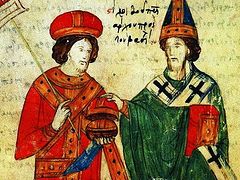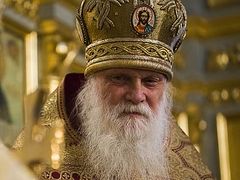Alexandria, Egypt, June 13, 2023
 Photo: patriarchateofalexandria.com
Photo: patriarchateofalexandria.com
A joint commission of Orthodox and Catholic theologians met in Alexandria, Egypt, for a week earlier this month, resulting in the adoption of the document, “Synodality and Primacy in the Second Millennium and Today.”
Representing the Orthodox Church were Their Eminences Job, Metropolitan of Pisidia, Co-President of the Joint Theological Commission, Maximos Metropolitan of Silivria and Fr. Alexis Torrance (Ecumenical Patriarchate), Gennadios, Metropolitan of Botswana, Petros Metropolitan of Accra and Professor Gregory Liantas (Patriarchate of Alexandria), Archbishop Nektarios Anthidonos and Professor Theodoros Giagkou (Patriarchate of Jerusalem), Metropolitan Joseph of Western and Southern Europe and Fr. Patriciu Vlaicu (Patriarchate of Romania), Metropolitan Theodoros of Akhaltsikhe and Fr. Georgios Zviadadze (Patriarchate of Georgia), Metropolitan Vasileios of Konstantia and Ammochostos and Fr. Gregory Ioannidis (Church of Cyprus), Metropolitan Chrysostomos of Messinia and Fr. Amphilochius Miltos (Church of Greece), Professors Messrs. Jerzy Ostapczuk and Jerzy Betlejko (Church of Poland), Metropolitan Iοannis of Korçë and Professor Nathan Hoppe (Church of Albania), Metropolitan Juraj of Mikhalovsky and Fr. Kyrillos Sarkisian (Church of the Czech Republic and Slovakia).
The document considers the troubled history of the second millennium in four periods: from 1054 to the Council of Florence (1438-1439), from the Reformation to the 18th century, the 19th century, and the 20th and 21st centuries.
The text frankly admits several times that the ecclesiology of the modern Catholic church is not that of the first millennium. In the first period, up through the Council of Florence, the Western Church developed a more “juridical ecclesiology” and mendicant orders such as the Franciscans and Dominicans “promoted a conception of the papacy as being entrusted with the pastoral care of the whole Church.”
The joint text also states that the Crusades led to the anti-canonical appointment of Latin hierarchs in places where Greek hierarchs already existed and abolishment of the autocephaly of the Church of Cyprus.
On the other hand, the Orthodox Church preserved a more canonical ecclesiology:
During the second millennium in the East, the conciliar institution functioned according to the canonical principles of Apostolic Canon 34, where the Patriarch of Constantinople as the protos and the bishops present in Constantinople participated in sessions of the Endemousa Synod. Through the Endemousa Synod, the Church expressed a form of permanent synodality in which the patriarchs of the East, present in Constantinople, or their representatives, and other bishops were convoked by the Patriarch of Constantinople to make synodal decisions.
Meanwhile, the Orthodox Church was later subjected to the juridical millet system in which all Orthodox Christians in the Ottoman Empire were made dependent upon the Ecumenical Patriarchate in ecclesiastical and civil matters, though the spirit of synodality was nevertheless preserved, the document notes.
In the third period, the Vatican I Council “left its ecclesiology unbalanced”: “Its dogmatic teaching on the papacy was not complemented by teaching on the episcopacy nor contextualized by broader teaching on the Church.”
Papal infallibility, adopted at Vatican I, is unacceptable to the Orthodox because they understand infallibility as belonging to the Church as a whole, the text emphasizes.
In the fourth period, Orthodox-Catholic relations have benefited from a general “return to the sources” of the Scripture and Fathers, and both sides have focused more on the Church as communion in the 20th century.
Much attention is given to the Crete Council of 2016 and its many preparatory councils. Here the new document contains a serious factual error, stating that: “Four Synaxes of the primates of the autocephalous Orthodox Churches (Constantinople 2008 and 2014, Chambésy 2016, and Crete 2016) led to the convocation of the Holy and Great Council by Ecumenical Patriarch Bartholomew with the unanimous consent of the primates of the Orthodox Churches in Crete.” In fact, His Beatitude Patriarch John X of Antioch and the Antiochian Patriarchate explicitly did not consent to the holding of the council.
In contract to Vatican I, Vatican II struck a greater balance between the bishops and the pope, and recognized that the Orthodox Church has true Sacraments, the new text notes.
Having covered much history, the document proceeds to six conclusions:
-
“Major issues complicate an authentic understanding of synodality and primacy in the Church… Our historical study of synodality and primacy in the second millennium has shown the inadequacy of both of these views.”
-
“The Second Vatican Council opened new perspectives by fundamentally interpreting the mystery of the Church as one of communion… In the Orthodox Church, synodality and primacy are practised at the panorthodox level, according to the canonical tradition, by the holding of holy and great councils.”
-
“The Church is deeply rooted in the mystery of the Holy Trinity, and a eucharistic ecclesiology of communion is the key to articulating a sound theology of synodality and primacy.”
-
“The interdependence of synodality and primacy is a fundamental principle in the life of the Church… What is required in new circumstances is a new and proper application of the same governing principle.”
-
“Orthodox and Roman Catholics are committed to finding ways to overcome the alienation and separation that occurred during the second millennium.”
-
“Having reflected together on the history of the second millennium, we acknowledge that a common reading of the sources can inspire the practice of synodality and primacy in the future.”
Follow OrthoChristian on Twitter, Vkontakte, Telegram, WhatsApp, MeWe, and Gab!



